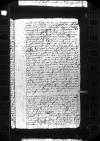Das euch mit und al den ewren in Gots gnaden allenthalbenn wol ging, / wor uns fast lieb und angenemm zu wissen.
Wir haben euch disse jar her etlich mol geschribnn / und nemlich was die ⌊tochterr⌋ / und die XII ducaten ⌊Olbrecht Kuon⌋ botr[ef]fend und bisher kein antwurt erlangt. / Wisse[n] nicht, wie wirs vor sehen, / oder ab ir etwas unmut... gen uns, / darzu wir mit unsermm bedenckenn kein ursach gege[nn] entfangen. / Haben der wegen in angefangner freunsch[aft] mit euch nicht mugen nochlossen abermols zu schreiben freuntlich bittend uns zu antwurten / und uff unse[r] vorige ansuchen ewer gunstig gemuet gen uns zu eröffenen. / Bey uns in angefangner lieb und freuntschafft, die wir zu euch tragen, ist nichts / und sol ouc[h] nichts in zu kumfftigen geczeiten abgegangen, gefunden werdenn, / des wir uns ouch genczlich zu euch vorsehe[n]. Negst hot uns gen ⌊Krako⌋ in der ⌊Kron Polen⌋ ⌊reichst[age]⌋ ewerr svogerr ⌊Bartolme Schrenk⌋ ⌊⌋ und angezceigt, wie er unser gefatterin, ewer ⌊hausfrawenn⌋ svester ⌊Sibillen⌋, zu eynemm ehegaten genomenn, / darann wir nicht kleinenn wolgefallnn gehabt. / Der gestalt uberkomme wir brive von ewren freundenn, / den wir wor inne sie unser begeren / gernn zu willen sein, / vo[r] euch aber alse von unsermm vornembstnn freunde hab[en] wir so lange zceit herr kein schreibnn gesehen, / hirummb wir vorursocht euch solchs langen sweigens zu erinneren und freuntlich bitten, uns weitlofftig wolt lossen wissen, wie es euch mit den ewrn ghet / und wie, ouch wor ir haus haltet. Es kan euch so wol nicht ghen, / wir wolten, das es noch vil besserr werr etc.
Es hoth uns negst mit un... klagen ⌊Isabella Delgada⌋ geschribnn irer ⌊tochter⌋ hal[benn]. Wie dem ouch sey, noch wold wir nicht gernn, das die ⌊tochter⌋ der ⌊mutterr⌋ sold volgen. / Het ⌊sie⌋ unser erbitten angenomenn, wer vor sie vil besser gewest. / Do mit aber das arm ⌊kint⌋ nicht zu schant... kuem , / wold wir uns nicht besvere[n]. / Wil sie es von ir gebenn / ummb Gots wille[nn] zu helffenn, das die armm ⌊tochterr⌋ mocht zu ehren komenn / und bittn, wolt sie zu euch nemenn, / das sie der gefatterin ewer ⌊hausfrawenn⌋ imm hause, dine bissolange, das sie gancz her mochte gebrocht werden. / Was daruff wurd ghen, wolde wi[r] euch zu grossem dancke erlegenn. / Wirt die⌊ mu[t]ter⌋ so gesint, / wolle wir ir in ⌊Hispanienn⌋, / die weil wir lebnn, alle jor XX ducaten vormachenn, / solche meynung wir ir ouch ⌊⌋. / So nicht, / wolle wir ummb sie ⌊beide⌋ nichts mher wissenn. / ⌊Ir⌋ , ist unvorborgen, wie wir euch zuvor geschribnn, / der sachen gelegenheit etc. Was wir und ir hirinne werden thun / uff unser darlegenn, / geschicht lauterr ummb Gots willnn etc.
Freuntlicher, liberr her gefatter, / wir ⌊⌋ euch in unsernn negstnn / bittend, uns wolt ein 4 parr nicht adobirt hanczschen von ⌊Ciuidad Real⌋ oder wor sie im besten gemacht werden, zuschicken, / donebnn etliche besuagas und VIII 3 stuczen zum schreibnn, ouch drey wie die frawenn tragen. / Was das alles geschen wirt, wolle wir zu ⌊Dancke⌋ erlegenn / unnd euch widerummb senden, was euch aus ⌊dissen landen⌋ thut gefallenn etc.
Von newen zceitungen hab wir dis mol nichts besunders, / allein das der ⌊Turk⌋ vil folks in ⌊Hungern⌋ geschickt / und macht noch vil mher, / wie gesagt wirt, / das nye so vil kriegsfolk in ⌊Turkeyen⌋ zu samme gewest, / und das alle uff ⌊Osterreich⌋ und ⌊Deuczland⌋. / Ist zu besorgen, wirt uns mit dreffenn. / Danck hab ⌊der von ⌊Franreich⌋⌋, / Got wirt seiner stroff gen in ouch zu seiner zceit nicht vorgessenn. / Was ir vor zceitung habt, wolt uns ouch mitteilen, / und wie es allenthalbnn bey ⌊kayserlicher majestet⌋ und in ⌊Hispanien⌋ zu gath. / Hie mit euch und ewer togentszame ⌊hausfrau⌋ unser gefatterin, / die wir fruntlich bittnn von unsernn wegen zu grussen, / Gothe dem almechtigen befholenn. /

